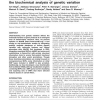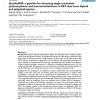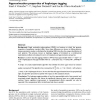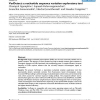BMCBI
2005
13 years 9 months ago
2005
Background: Recent studies have shown that the patterns of linkage disequilibrium observed in human populations have a block-like structure, and a small subset of SNPs (called tag...
NAR
2006
13 years 9 months ago
2006
We have developed a web tool, PupaSuite, for the selection of single nucleotide polymorphisms (SNPs) with potential phenotypic effect, specifically oriented to help in the design ...
NAR
2008
13 years 9 months ago
2008
Understanding how genetic variation affects the molecular function of gene products is an emergent area of bioinformatic research. Here, we present updates to MutDB (http://www.mu...
JCB
2008
13 years 9 months ago
2008
Large-scale whole genome association studies are increasingly common, due in large part to recent advances in genotyping technology. With this change in paradigm for genetic studi...
BMCBI
2007
13 years 9 months ago
2007
Background: We have developed a new haplotyping program based on the combination of an iterative multiallelic EM algorithm (IEM), bootstrap resampling and a pseudo Gibbs sampler. ...
BMCBI
2007
13 years 9 months ago
2007
Background: Since the single nucleotide polymorphisms (SNPs) are genetic variations which determine the difference between any two unrelated individuals, the SNPs can be used to i...
BMCBI
2006
13 years 9 months ago
2006
Background: Single Nucleotide Polymorphisms (SNPs) are the most common type of polymorphisms found in the human genome. Effective genetic association studies require the identific...
BMCBI
2006
13 years 9 months ago
2006
Background: Single nucleotide polymorphisms (SNPs) are important tools in studying complex genetic traits and genome evolution. Computational strategies for SNP discovery make use...
BMCBI
2006
13 years 9 months ago
2006
Background: Single nucleotide polymorphisms (SNPs) are locations at which the genomic sequences of population members differ. Since these differences are known to follow patterns,...
BMCBI
2008
13 years 9 months ago
2008
Background: Single nucleotide polymorphisms (SNPs) are the most commonly studied units of genetic variation. The discovery of such variation may help to identify causative gene mu...






